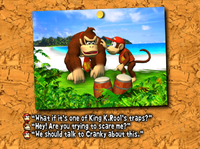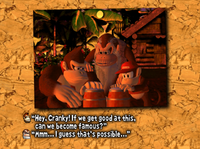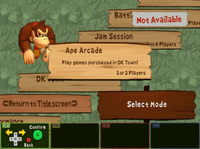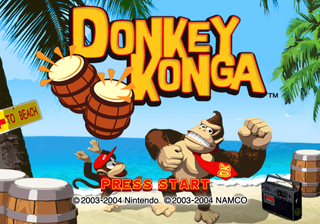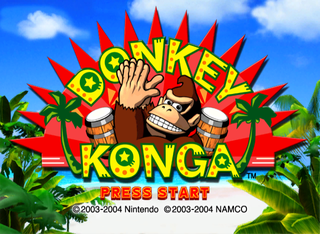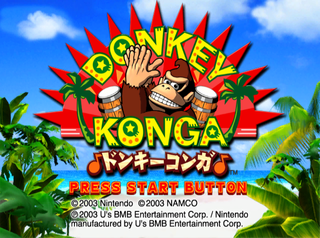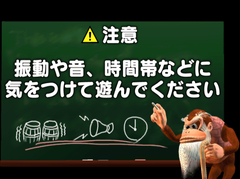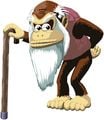Donkey Konga: Difference between revisions
m (not all with vocals/singing/lyrics => not all are songs) |
(Quite unlikely.) Tags: Mobile edit Advanced mobile edit |
||
| (166 intermediate revisions by 72 users not shown) | |||
| Line 1: | Line 1: | ||
{{italic title}} | {{italic title}} | ||
{{ | {{About|the video game|the series|[[Donkey Konga (series)]]|the microsite|[[Donkey Konga (Flash game)]]}} | ||
{{infobox | {{game infobox | ||
|image=[[File:Dkk.jpg|250px]] | |image=[[File:Dkk.jpg|250px]] | ||
|developer=[[Namco]] | |developer=[[Namco]] | ||
|publisher=[[Nintendo]] | |publisher=[[Nintendo]] | ||
| | |release={{flag list|Japan|December 12, 2003|USA|September 27, 2004|Europe|October 15, 2004|Australia|October 28, 2004<ref>{{cite|deadlink=y|archive=web.archive.org/web/20120307084711/http://palgn.com.au/1696/updated-australian-release-list-24-10-04|language=en-au|title=Updated Australian Release List – 24/10/04|publisher=PALGN Video Game Feature|accessdae=June 28, 2024}}</ref>}} | ||
|languages={{languages|en_us=y|fr_ca=y|es_latam=y|jp=y}} | |||
|genre=[[Genre#Rhythm games|Rhythm]] | |||
|genre= | |modes=Single player, multiplayer | ||
|modes= | |ratings={{ratings|esrb=E|pegi=3|cero=A|usk=0|acb=g}} | ||
|ratings={{ratings|esrb=E|pegi=3|cero=A|usk=0}} | |platforms=[[Nintendo GameCube]] | ||
|platforms=[[ | |format={{format|gcn=1}} | ||
| | |||
|input={{input|dkbongo=1}} | |input={{input|dkbongo=1}} | ||
|serials={{flag list|Japan|DOL-GKGJ-JPN}} | |||
}} | }} | ||
'''''Donkey Konga''''' is a | '''''Donkey Konga''''' is a [[Donkey Kong (franchise)|''Donkey Kong'']] video game for the [[Nintendo GameCube]]. It was developed by [[Namco]] and published by [[Nintendo]] in 2003 in Japan and 2004 overseas. It is the first installment of the [[Donkey Konga (series)|''Donkey Konga'' series]], and it is notable for being the first game to be compatible with the [[Nintendo GameCube#DK Bongos|DK Bongos]]. A year later, a sequel to the game was released, ''[[Donkey Konga 2]]'', followed by ''[[Donkey Konga 3 JP]]'', the latter of which never received an international release. | ||
==Story== | ==Story== | ||
[[File:DKa opening.png|thumb|left|The opening sequence]] | |||
[[File:DKa opening 2.png|thumb|left|Donkey Kong realizes the potential to become famous from playing bongos.]] | |||
[[Donkey Kong]] and [[Diddy Kong]] are strolling across a beach and suddenly find a mysterious pair of [[barrel]]s. DK attempts to open it but is stopped by Diddy, who believes it is a trap from [[King K. Rool]]. | |||
Following Diddy's advice, the duo take the barrels to [[Cranky Kong]]. Cranky chuckles and explains that they are bongos. DK decides to call them the "DK Bongos", and he plays on them. Diddy comments that DK is bad at the bongos, and he tries the bongos. DK, in turn, laughs and claims that Diddy plays the bongos poorly. He claps, which cause the bongos to glow. Cranky explains that the instrument glows and makes noises from detecting clapping. | |||
In response, Donkey Kong and Diddy perform and clap with the bongos more. After they make a lot of loud noise, DK becomes discouraged and admits that he and Diddy are not good at playing the bongos. Cranky explains that nobody starts out as a professional, and their performance gradually improves from practicing. DK initially mentions his dislike of practicing, but suddenly realizes that he might achieve fame if he becomes good at the bongos, which Cranky believes to be a possibility. DK and Diddy then daydream about becoming rich and owning lots of bananas, causing Cranky to sigh and remind them to practice; the pair head out to get some training in as the scene ends. | |||
{{br|left}} | |||
== | ==Gameplay== | ||
[[File:DKa Main Menu.png|thumb|The main menu.]] | |||
The main gameplay is largely identical to the ''{{wp|Taiko no Tatsujin}}'' games, which were also designed by the same developers. The player has the option to utilize the DK Bongos or a standard GameCube controller. During gameplay, the player controls [[Donkey Kong]], whose goal is to hit scrolling notes, known as beats. They must hit it with accurate timing when it moves under a cursor on the far left. There are four types of beats (red, light blue, yellow, and purple), and are each associated with a different button. A word appears on screen for every passing note, and the displayed word is based on the accuracy of the player hitting the beat. A combo is displayed if the player hits two or more consecutive beats, but it vanishes if the player misses a beat. | |||
== | {|class="wikitable dk" width=40% | ||
|- | |||
!Variant | |||
!Button | |||
|- | |||
|[[File:DKa yellow button.png|Yellow]]<br>Left drum beat | |||
|'''Bongos:''' Left pad<br>'''Controller:''' {{button|gcn|Stick}} or {{button|gcn|Pad}} | |||
|- | |||
|[[File:DKa red button.png|Red]]<br>Right drum beat | |||
|'''Bongos:''' Right pad<br>'''Controller:''' {{button|gcn|A}}, {{button|gcn|B}}, {{button|gcn|X}}, {{button|gcn|Y}}, {{button|gcn|C}} | |||
|- | |||
|[[File:DKa light blue button.png|Light blue]]<br>Clap | |||
|'''Bongos:''' Clap<br>'''Controller:''' {{button|gcn|L}}, {{button|gcn|R}}, {{button|gcn|Z}} | |||
|- | |||
|[[File:DKa purple button.png|Purple]]<br>Both drum beats | |||
|'''Bongos:''' Both pads<br>'''Controller:''' Simultaneously hitting a button representing each a yellow and red note | |||
|} | |||
=== | ===Modes=== | ||
All four gameplay modes (except Challenge) have three levels of difficulty modes, from lowest to highest: Monkey, Chimp, and Gorilla. The second player plays as [[Diddy Kong]] in multiplayer modes. Every song has a varying number of beats, which is indicated from the number of barrels next to their titles on the selection menu. | |||
=== | {{content description|dk=y | ||
|image1=[[File:DKa Street Performance mode.png|200px]] | |||
|name1=Street Performance<br>1 player | |||
|description1=Based on the concept of {{wp|street performance}}, Donkey Kong can perform songs and earn Coins, which he can use to purchase unlockables at DK Town. During gameplay, Donkey Kong earns two coins for every beat that he hits with perfect timing, or one coin for regularly-timed beats. A coin counter appears next to [[Ellie the Elephant|Ellie]] at the bottom-left with a self-explanatory purpose of keeping count of the number of collected coins. A bar at the top-right corner tracks how many notes the player hit. A "CLEAR" label appears in the center, and it divides the bar into two color-coded segments, red and yellow, which respectively represent poor and good performance. The bar gradually fills up for every note hit by the player, but it contrarily decreases for every missed note. The results are calculated after the song ends; Donkey Kong wins if the bar fills past the Clear label and keeps the Coins that he obtained on the way. If Donkey Kong loses at a challenge, he does not keep the coins. | |||
|image2=[[File:DKa Challenge mode.png|200px]]<br>1-2 players | |||
|name2=Challenge | |||
|description2=A mode where the player performs an endless number of songs to see how many they can clear. The song number is displayed on a counter in front of two [[Steel Keg]]s. | |||
|image3=[[File:DKa Battle mode.png|200px]]<br>2 players | |||
|name3=Battle | |||
|description3=A multiplayer mode where Donkey Kong and Diddy competitively perform a song with a goal for the highest score. | |||
|image4=[[File:DKa Jam Session mode.png|200px]]<br>1-4 players | |||
|name4=Jam Session | |||
|description4=In this mode, DK and Diddy can practice their performance on songs. A displayed scoreboard counts by accuracy (Great, OK, and Bad) along with the number of missed beats. | |||
|image5=[[File:DKa Ape Arcade menu.png|200px]]<br>1-2 players | |||
|name5=Ape Arcade | |||
|description5=DK and Diddy can play the mini-games here if they purchased them from DK Town. | |||
|image6=[[File:DKa DK Town menu.png|200px]]<br>1 player | |||
|name6=DK Town | |||
|description6=DK Town is the only mode to solely take place on the main menu. Here, the player has the ability to purchase unlockables, including songs with on Gorilla difficulty level, mini-games, and sound sets. They can also view Street Performance, Challenge, and mini-game high scores in the Hall of Records. The former two options have individual charts per difficulty level. Lastly, the player can access the Electric Hut to change a few settings: Stereo/Mono, Volume Balance, and DK Bongo and Controller. The second option, Default, resets each setting to their default value. | |||
}} | |||
===DK Town unlockables=== | |||
==== Jungle Jams ==== | |||
The player can purchase individual songs to perform on Gorilla (expert) difficulty. | |||
=== | ====Bongo Sets==== | ||
The player can purchase alternate sounds for the bongos to make during gameplay. They cost the following amount of coins: | |||
{{columns| | |||
*Electric Drum Set: 25,000 coins | |||
*Konga Crew Set: 64 coins | |||
*Toy Set: 14,900 coins | |||
*Quiz Set: 912 coins | |||
*Mario Set: 4,599 coins | |||
*Dogs Set: 11 coins | |||
*Kirby Set: 2,599 coins | |||
*Latin Percussion Set: 1,900 coins | |||
*Zelda Set: 4,599 coins | |||
*Big Band Set: 88 coins | |||
*Laser Space Set: 77 coins | |||
*Car Set: 66 coins | |||
*Country Set: 49 coins | |||
*Barnyard Set: 1,050 coins | |||
*Classical Orchestra Set: 2,220 coins | |||
*Cold Set: 460 coins | |||
*Whip It Set: 707 coins | |||
*Jungle Set: 333 coins | |||
}} | |||
=== | ====Monkey Shines==== | ||
The player can purchase three mini-games to play in the ape arcade, two of which have a 2-player competitive (Vs.) mode. | |||
= | {{content description|dk=y | ||
|image1=[[File:100M Vine Climb DKa.png|200px]] | |||
|name1=[[100M Vine Climb]]<br>Cost: 4,800 coins | |||
|description1='''Single player''': "Climb vines and collect fruit to set records!"<br>'''Multiplayer (Vs.)''': "Climb vines and collect fruit to be the king of the Jungle! | |||
|image2=[[File:Banana Juggle DKa.png|230px]] | |||
|name2=[[Banana Juggle]]<br>Cost: 5,800 coins | |||
|description2='''Single player''': "Juggle bananas and set records!"<br>'''Multiplayer (Vs.)''': "Compete at juggling! Only one ape can win!" | |||
|image3=[[File:Bash K.Rool DKa.png|230px]] | |||
|name3=[[Bash K.Rool]]<br>Cost: 5,800 coins | |||
|description3="Slam King K.Rool back into the ground. Go for high scores!" | |||
}} | |||
== | ==List of songs== | ||
''Donkey Konga'' features around thirty songs, most of which differ between regional release. Every region has songs that originate from other Nintendo titles along with traditional music, including kids' medleys, pop and classical. Almost every traditional song was made into a shortened cover for the North American release. | |||
{| class="wikitable sortable dk" | |||
|- | |||
!colspan=2 | Song | |||
!colspan=3 | Difficulty | |||
!rowspan=2 | Jungle<br>Jams Cost | |||
!colspan=3 | Ordering | |||
|- | |||
! Artist | |||
! Song Name | |||
! Monkey | |||
! Chimp | |||
! Gorilla | |||
! NA | |||
! EU | |||
! JP | |||
|- | |||
| | |||
| '''Diddy's Ditties'''<ref group="note">A medley of {{wp|Happy Birthday to You}}; {{wp|Itsy Bitsy Spider}}; and {{wp|Row, Row, Row Your Boat}}.</ref> | |||
| ★★ | |||
| ★★ | |||
| ★★★★ | |||
| 365 | |||
| 1 | |||
| | |||
| | |||
|- | |||
| | |||
| '''{{wp|Bingo (folk song)|Bingo}}''' | |||
| ★★★★★ | |||
| ★★ | |||
| ★★ | |||
| 25 | |||
| 2 | |||
| | |||
| | |||
|- | |||
| | |||
| '''Campfire Medley'''<ref group="note">A medley of {{wp|I've Been Working on the Railroad}}, {{wp|She'll Be Coming 'Round the Mountain}}, {{wp|Yankee Doodle}}.</ref> | |||
| ★ | |||
| ★★★ | |||
| ★★★ | |||
| 580 | |||
| 3 | |||
| | |||
| | |||
|- | |||
| | |||
| '''{{iw|bulbapedia|Pokémon Theme}}''' | |||
| ★★★ | |||
| ★★★★ | |||
| ★★★★★ | |||
| 250 | |||
| 4 | |||
| | |||
| | |||
|- | |||
| | |||
| '''{{iw|wikirby|Kirby: Right Back at Ya! (song)|Kirby: Right Back at Ya!}}''' | |||
| ★★★ | |||
| ★★★★ | |||
| ★★★★ | |||
| 848 | |||
| 5 | |||
| | |||
| | |||
|- | |||
| {{wp|Queen (band)|Queen}} | |||
| '''{{wp|We Will Rock You}}''' | |||
| ★ | |||
| ★ | |||
| ★★★★ | |||
| 69 | |||
| 6 | |||
| | |||
| | |||
|- | |||
| {{wp|Leslie Carter}} | |||
| '''{{wp|Like Wow}}''' | |||
| ★★★★★ | |||
| ★★★★★ | |||
| ★★★★★★ | |||
| 1898 | |||
| 7 | |||
| | |||
| | |||
|- | |||
| {{wp|The Troggs}} | |||
| '''{{wp|Wild Thing (The Troggs song)|Wild Thing}}''' | |||
| ★★ | |||
| ★★★ | |||
| ★★★★★★ | |||
| 580 | |||
| 8 | |||
| 20 | |||
| | |||
|- | |||
| {{wp|The Partridge Family}} | |||
| '''{{wp|I Think I Love You}}''' | |||
| ★★★★★★★ | |||
| ★★★ | |||
| ★★★ | |||
| 99 | |||
| 9 | |||
| | |||
| | |||
|- | |||
| {{wp|Richard Berry (musician)|Richard Berry}} | |||
| '''{{wp|Louie Louie}}''' | |||
| ★★ | |||
| ★★★★★★ | |||
| ★★★★ | |||
| 1990 | |||
| 10 | |||
| 12 | |||
| | |||
|- | |||
| {{wp|Little Eva}} | |||
| '''{{wp|The Loco-Motion}}''' | |||
| ★★★ | |||
| ★★★★★ | |||
| ★★★★ | |||
| 2060 | |||
| 11 | |||
| 4 | |||
| | |||
|- | |||
| {{wp|Earth, Wind, & Fire}} | |||
| '''{{wp|Shining Star (Earth, Wind & Fire song)|Shining Star}}''' | |||
| ★★ | |||
| ★★★ | |||
| ★★★★ | |||
| 1005 | |||
| 12 | |||
| | |||
| | |||
|- | |||
| {{wp|Blink-182}} | |||
| '''{{wp|All the Small Things}}''' | |||
| ★★★★★ | |||
| ★★★★★★ | |||
| ★★★ | |||
| 1313 | |||
| 13 | |||
| 10 | |||
| | |||
|- | |||
| {{wp|Stray Cats}} | |||
| '''{{wp|Rock This Town}}''' | |||
| ★★★★★ | |||
| ★★★★★★ | |||
| ★★★ | |||
| 644 | |||
| 14 | |||
| | |||
| | |||
|- | |||
| {{wp|The Supremes}} | |||
| '''{{wp|You Can't Hurry Love}}''' | |||
| ★★★ | |||
| ★★★★ | |||
| ★★★★ | |||
| 3399 | |||
| 15 | |||
| 9 | |||
| | |||
|- | |||
| {{wp|Jesus Jones}} | |||
| '''{{wp|Right Here, Right Now (Jesus Jones song)|Right Here, Right Now}}''' | |||
| ★★★ | |||
| ★★★★ | |||
| ★★★★ | |||
| 1200 | |||
| 16 | |||
| | |||
| | |||
|- | |||
| {{wp|Martha and the Vandellas}} | |||
| '''{{wp|Dancing in the Street}}''' | |||
| ★★★★★ | |||
| ★★★★★★★ | |||
| ★★★★★★★★ | |||
| 1745 | |||
| 17 | |||
| 5 | |||
| | |||
|- | |||
| {{wp|The B-52's}} | |||
| '''{{wp|Rock Lobster}}''' | |||
| ★ | |||
| ★★★★★ | |||
| ★★★ | |||
| 980 | |||
| 18 | |||
| | |||
| | |||
|- | |||
| {{wp|Neil Sedaka}} | |||
| '''{{wp|Stupid Cupid}}''' | |||
| ★★★★★ | |||
| ★★★ | |||
| ★★ | |||
| 1599 | |||
| 19 | |||
| | |||
| | |||
|- | |||
| {{wp|The Mighty Mighty Bosstones}} | |||
| '''{{wp|The Impression That I Get}}''' | |||
| ★★★★★★★★ | |||
| ★★★★★★ | |||
| ★★★ | |||
| 1399 | |||
| 20 | |||
| 14 | |||
| | |||
|- | |||
| {{wp|The Romantics}} | |||
| '''{{wp|What I Like About You (The Romantics song)|What I Like About You}}''' | |||
| ★★★★★★★★ | |||
| ★★★★★★ | |||
| ★★★ | |||
| 590 | |||
| 21 | |||
| | |||
| | |||
|- | |||
| {{wp|Devo}} | |||
| '''{{wp|Whip It (Devo song)|Whip It}}''' | |||
| ★★★★ | |||
| ★★★★★ | |||
| ★ | |||
| 707 | |||
| 22 | |||
| | |||
| | |||
|- | |||
| {{wp|The Crystal Method}} | |||
| '''{{wp|Busy Child}}''' | |||
| ★★★ | |||
| ★★★★★★★★ | |||
| ★★★★★★★★ | |||
| 800 | |||
| 23 | |||
| 15 | |||
| | |||
|- | |||
| {{wp|Tito Puente}} | |||
| '''Para Los Rumberos''' | |||
| ★★★★★★★★ | |||
| ★★★★★★★★ | |||
| ★★★★★★ | |||
| 380 | |||
| 24 | |||
| 6 | |||
| | |||
|- | |||
| {{wp|Louis Prima}} | |||
| '''{{wp|Sing, Sing, Sing (With a Swing)}}''' | |||
| ★★★★ | |||
| ★★★★★★ | |||
| ★★★★★★ | |||
| 12 | |||
| 25 | |||
| 7 | |||
| | |||
|- | |||
| {{wp|Tito Puente}} | |||
| '''{{wp|Oye Cómo Va}}''' | |||
| ★★★ | |||
| ★★★ | |||
| ★★★★★★★★ | |||
| 2250 | |||
| 26 | |||
| 11 | |||
| | |||
|- | |||
| {{wp|Willie Nelson}} | |||
| '''{{wp|On the Road Again (Willie Nelson song)|On the Road Again}}''' | |||
| ★★ | |||
| ★★★★★★★ | |||
| ★★★★★★ | |||
| 1600 | |||
| 27 | |||
| | |||
| | |||
|- | |||
| {{wp|Johannes Brahms}} | |||
| '''Hungarian Dance No.5 in G Minor''' | |||
| ★★★★ | |||
| ★★★★★ | |||
| ★★★★ | |||
| 1848 | |||
| 28 | |||
| 23 | |||
| 29 | |||
|- | |||
| {{wp|Wolfgang Amadeus Mozart}} | |||
| '''{{wp|Piano Sonata No. 11 (Mozart)|Turkish March}}''' | |||
| ★★ | |||
| ★★★★ | |||
| ★★ | |||
| 331 | |||
| 29 | |||
| 24 | |||
| 28 | |||
|- | |||
| | |||
| '''[[DK Rap]]''' | |||
| ★★★ | |||
| ★★ | |||
| ★ | |||
| 6800 | |||
| 30 | |||
| 31 | |||
| 31 | |||
|- | |||
| | |||
| '''The Legend of Zelda Theme''' | |||
| ★★★★★★ | |||
| ★★★★★ | |||
| ★★★★★ | |||
| 4900 | |||
| 31 | |||
| 27 | |||
| | |||
|- | |||
| | |||
| '''[[Ground Theme (Super Mario Bros.)|Super Mario Bros. Theme]]''' | |||
| ★★★★ | |||
| ★★★★★★★★ | |||
| ★★★★★ | |||
| 4900 | |||
| 32 | |||
| 25 | |||
| 30 | |||
|- | |||
| | |||
| '''Donkey Konga Theme''' | |||
| ★★★★ | |||
| ★★★★★ | |||
| ★★★★★ | |||
| 100 | |||
| 33 | |||
| 30 | |||
| 32 | |||
|- | |||
| {{wp|Supergrass}} | |||
| '''{{wp|Alright (Supergrass song)|Alright}}''' | |||
| ★★★★ | |||
| ★★★★ | |||
| ★★★★★★★ | |||
| 250 | |||
| | |||
| 1 | |||
| | |||
|- | |||
| {{wp|Jamiroquai}} | |||
| '''{{wp|Canned Heat (song)|Canned Heat}}''' | |||
| ★★★★★★ | |||
| ★★★★★★ | |||
| ★★★★★★★ | |||
| 25 | |||
| | |||
| 2 | |||
| | |||
|- | |||
| {{wp|Queen (band)|Queen}} | |||
| '''{{wp|Don't Stop Me Now}}''' | |||
| ★★★★★★★ | |||
| ★★★★★★ | |||
| ★★★★★ | |||
| 1777 | |||
| | |||
| 3 | |||
| | |||
|- | |||
| {{wp|Chumbawumba}} | |||
| '''{{wp|Tubthumping}}''' | |||
| ★ | |||
| ★★★ | |||
| ★★★★★ | |||
| 69 | |||
| | |||
| 8 | |||
| | |||
|- | |||
| {{wp|Nena (band)|Nena}} | |||
| '''{{wp|99 Luftballons|99 Red Balloons}}''' | |||
| ★★★★★★★ | |||
| ★★★★★★★ | |||
| ★★★ | |||
| 99 | |||
| | |||
| 13 | |||
| | |||
|- | |||
| {{wp|The Jackson 5}} | |||
| '''{{wp|I Want You Back}}''' | |||
| ★★★★ | |||
| ★★★★★★ | |||
| ★★★ | |||
| 1898 | |||
| | |||
| 16 | |||
| | |||
|- | |||
| {{wp|Jamiroquai}} | |||
| '''{{wp|Cosmic Girl}}''' | |||
| ★★★ | |||
| ★★★ | |||
| ★★ | |||
| 980 | |||
| | |||
| 17 | |||
| | |||
|- | |||
| {{wp|Supergrass}} | |||
| '''{{wp|Richard III (song)|Richard III}}''' | |||
| ★★★★ | |||
| ★★★★★ | |||
| ★★★★★★★ | |||
| 111 | |||
| | |||
| 18 | |||
| | |||
|- | |||
| {{wp|Labelle}} | |||
| '''{{wp|Lady Marmalade}}''' | |||
| ★★★★ | |||
| ★★★★★ | |||
| ★★★★★★★ | |||
| 365 | |||
| | |||
| 19 | |||
| | |||
|- | |||
| {{wp|Earth, Wind & Fire}} | |||
| '''{{wp|September (Earth, Wind & Fire song)|September}}''' | |||
| ★★★★★★★★ | |||
| ★★★★★ | |||
| ★★★ | |||
| 930 | |||
| | |||
| 21 | |||
| | |||
|- | |||
| {{wp|Take That}} | |||
| '''{{wp|Back for Good (song)|Back for Good}}''' | |||
| ★★ | |||
| ★★★ | |||
| ★★ | |||
| 707 | |||
| | |||
| 22 | |||
| | |||
|- | |||
| | |||
| '''[[DK Island Swing|Donkey Kong Country Theme]]''' | |||
| ★★★ | |||
| ★ | |||
| ★★★ | |||
| 1600 | |||
| | |||
| 26 | |||
| | |||
|- | |||
| | |||
| '''Rainbow Cruise''' | |||
| ★★★★★ | |||
| ★★★★ | |||
| ★★★★★★★★ | |||
| 1200 | |||
| | |||
| 28 | |||
| | |||
|- | |||
| | |||
| '''Super Smash Bros. Melee Opening''' | |||
| ★★★★★★ | |||
| ★★★★★★★ | |||
| ★★★★★★★★ | |||
| 644 | |||
| | |||
| 29 | |||
| | |||
|- | |||
| | |||
| '''{{wp|The Other Day I Met a Bear|Mori no Kumasan}}''' | |||
| ★★★★ | |||
| ★★★★★★ | |||
| ★★★★★★★★ | |||
| 903 | |||
| | |||
| | |||
| 1 | |||
|- | |||
| | |||
| '''Clarinet o Kowashichatta''' | |||
| ★★★ | |||
| ★★★ | |||
| ★★★★ | |||
| 1001 | |||
| | |||
| | |||
| 2 | |||
|- | |||
| {{wp|Haydn Quartet (vocal ensemble)|Haydn Quartet}} | |||
| '''{{wp|My Grandfather's Clock|Okina Furudokei}}''' | |||
| ★★★ | |||
| ★★★★ | |||
| ★★★ | |||
| 969 | |||
| | |||
| | |||
| 3 | |||
|- | |||
| | |||
| '''Hyokkori Hyoutanjima'''<ref group="note">The theme song for the animated film of the same name.</ref> | |||
| ★ | |||
| ★ | |||
| ★ | |||
| 8 | |||
| | |||
| | |||
| 4 | |||
|- | |||
| {{wp|Akira Kushida}} | |||
| '''We are the One (Bokura wa Hitotsu)'''<ref group="note">The ending theme for ''{{wp|Bakuryū Sentai Abaranger}}''.</ref> | |||
| ★★ | |||
| ★★★★★ | |||
| ★★★★ | |||
| 1200 | |||
| | |||
| | |||
| 5 | |||
|- | |||
| | |||
| '''Hamtaro Tottoko Uta'''<ref group="note">The opening theme for ''{{wp|Hamtaro}}''.</ref> | |||
| ★★ | |||
| ★★★★ | |||
| ★★★★★★ | |||
| 868 | |||
| | |||
| | |||
| 6 | |||
|- | |||
| {{iw|bulbapedia|GARDEN}} | |||
| '''{{iw|bulbapedia|Advance Adventure}}'''<ref group="note">The first Japanese opening theme for ''{{iw|bulbapedia|Pokémon the Series: Ruby and Sapphire}}''.</ref> | |||
| ★★★★★ | |||
| ★★★★★★ | |||
| ★★★★ | |||
| 1300 | |||
| | |||
| | |||
| 7 | |||
|- | |||
| Hiroko Asakawa | |||
| '''{{iw|wikirby|Kirby! (opening theme)|Kirby!}}'''<ref group="note">The second Japanese opening theme for ''{{iw|wikirby|Kirby: Right Back at Ya!}}''.</ref> | |||
| ★★ | |||
| ★★ | |||
| ★★★★ | |||
| 1260 | |||
| | |||
| | |||
| 8 | |||
|- | |||
| | |||
| '''{{iw|starfywiki|Densetsu no Starfy}}'''<ref group="note">The theme from a Japanese commercial for the game.</ref> | |||
| ★★★ | |||
| ★★★★★ | |||
| ★★★ | |||
| 1000 | |||
| | |||
| | |||
| 9 | |||
|- | |||
| {{iw|pikipedia|Strawberry Flower}} | |||
| '''{{iw|pikipedia|Ai no Uta}}'''<ref group="note">A song created for Japanese commercials for ''{{iw|pikipedia|Pikmin (game)|Pikmin}}''.</ref> | |||
| ★★★★★★ | |||
| ★★★★★ | |||
| ★★★ | |||
| 1000 | |||
| | |||
| | |||
| 10 | |||
|- | |||
| {{wp|Yuzu (band)|Yuzu}} | |||
| '''Mata Aeru Hi Made'''<ref group="note">The eighth ending theme for {{wp|Doraemon (1979 TV series)|the second incarnation}} of the ''{{wp|Doraemon}}'' anime.</ref> | |||
| ★★ | |||
| ★★★ | |||
| ★★★★ | |||
| 1293 | |||
| | |||
| | |||
| 11 | |||
|- | |||
| {{wp|Mai Kuraki}} | |||
| '''{{wp|Kaze no La La La}}'''<ref group="note">The twelfth opening theme for ''{{wp|Case Closed}}'', better known as ''Detective Conan''.</ref> | |||
| ★★ | |||
| ★★★★ | |||
| ★★★★★ | |||
| 1000 | |||
| | |||
| | |||
| 12 | |||
|- | |||
| {{wp|Aya Matsuura}} | |||
| '''{{wp|Momoiro Kataomoi}}''' | |||
| ★★★★★★★ | |||
| ★★★★★★★ | |||
| ★★★★★★★ | |||
| 1020 | |||
| | |||
| | |||
| 13 | |||
|- | |||
| {{wp|Mini-Moni}} | |||
| '''{{wp|Mini-Moni Jankenpyon! / Haru Natsu Aki Fuyu Daisukki!|Mini-Moni Jankenpyon!}}''' | |||
| ★★★★★★ | |||
| ★★★★★★ | |||
| ★★★★★★ | |||
| 1020 | |||
| | |||
| | |||
| 14 | |||
|- | |||
| Re:Japan<ref group="note">Originally performed by {{wp|Kyu Sakamoto}}.</ref> | |||
| '''{{wp|Ashita ga Arusa}}''' | |||
| ★★ | |||
| ★★★★ | |||
| ★★★ | |||
| 23 | |||
| | |||
| | |||
| 15 | |||
|- | |||
| {{wp|Morning Musume}} | |||
| '''{{wp|Koi no Dance Site}}''' | |||
| ★★★★ | |||
| ★★★★ | |||
| ★★★★★ | |||
| 1020 | |||
| | |||
| | |||
| 16 | |||
|- | |||
| {{wp|Ayumi Hanasaki}} | |||
| '''{{wp|Fly High (Ayumi Hamasaki song)|Fly High}}''' | |||
| ★★★ | |||
| ★★★★★★ | |||
| ★★★★★★★★ | |||
| 1365 | |||
| | |||
| | |||
| 17 | |||
|- | |||
| {{wp|SMAP}} | |||
| '''Shake''' | |||
| ★★ | |||
| ★★★★ | |||
| ★★★ | |||
| 971 | |||
| | |||
| | |||
| 18 | |||
|- | |||
| {{wp|Akina Nakamori}} | |||
| '''{{wp|Desire (Jōnetsu)}}''' | |||
| ★★★ | |||
| ★★★★★ | |||
| ★★★★★★ | |||
| 1986 | |||
| | |||
| | |||
| 19 | |||
|- | |||
| {{wp|Hikaru Utada}} | |||
| '''{{wp|Colors (Hikaru Utada song)|Colors}}''' | |||
| ★★★ | |||
| ★★★ | |||
| ★★★★★ | |||
| 1100 | |||
| | |||
| | |||
| 20 | |||
|- | |||
| {{wp|I Wish (band)|I Wish}} | |||
| '''Asu e no Tobira'''<ref group="note">Opening theme of ''{{wp|Ainori}}''.</ref> | |||
| ★★★★ | |||
| ★★★★★★ | |||
| ★★★★★★★ | |||
| 1223 | |||
| | |||
| | |||
| 21 | |||
|- | |||
| {{wp|Maxi Priest}} and {{wp|Yūji Oda}} | |||
| '''Love Somebody'''<ref group="note">Opening theme of ''{{wp|Bayside Shakedown}}''.</ref> | |||
| ★★★★ | |||
| ★★★ | |||
| ★★ | |||
| 110 | |||
| | |||
| | |||
| 22 | |||
|- | |||
| {{wp|Godiego}} | |||
| '''The Galaxy Express 999'''<ref group="note">Opening theme of {{wp|Galaxy Express 999 (film)|the 1979 film adaptation}} of ''{{wp|Galaxy Express 999}}''.</ref> | |||
| ★★★★ | |||
| ★★★★★ | |||
| ★★★★ | |||
| 999 | |||
| | |||
| | |||
| 23 | |||
|- | |||
| {{wp|Jorge Ben}} | |||
| '''{{wp|Mas que Nada}}''' | |||
| ★★★★★★ | |||
| ★★★★★ | |||
| ★★★★★★ | |||
| 777 | |||
| | |||
| | |||
| 24 | |||
|- | |||
| {{wp|Ritchie Valens}} | |||
| '''{{wp|La Bamba (song)|La Bamba}}''' | |||
| ★★★ | |||
| ★★★★★★ | |||
| ★★★★★★★ | |||
| 666 | |||
| | |||
| | |||
| 25 | |||
|- | |||
| {{wp|Pérez Prado}} | |||
| '''{{wp|Mambo No. 5}}''' | |||
| ★★★★★★ | |||
| ★★★★★★★★ | |||
| ★★★★★★★ | |||
| 555 | |||
| | |||
| | |||
| 26 | |||
|- | |||
| | |||
| '''{{wp|Turkey in the Straw|Oklahoma Mixer}}''' | |||
| ★★ | |||
| ★★★ | |||
| ★★ | |||
| 4900 | |||
| | |||
| | |||
| 27 | |||
|} | |||
<references group="note"/> | |||
==Regional differences== | |||
Aside from a different set of songs, ''Donkey Konga''{{'}}s North American logo is different from the European and Japanese logo. This change is reflected both in-game and on each region's box cover. The Japanese logo has a subtitle, which western versions do not have. | |||
{{multiple image | |||
|align=center | |||
|direction=horizontal | |||
|header=Title screens | |||
|width=320 | |||
|image1=DKa Title Screen.png | |||
|caption1=North America | |||
|image2=DKa EU title screen.png | |||
|caption2=Europe | |||
|image3=DKa JP title screen.png | |||
|caption3=Japan | |||
}} | |||
{{br}} | |||
Every title screen depicts a scene of the beach, but the North American one displays a different scene from the European and Japanese versions. The latter two depict a straight view of the beach, which is partially obscured by the game's logo. The North American title screen shows [[Donkey Kong]] and [[Diddy Kong]] partying at the shore, complete with a pair of bongos and a boombox in the scene. | |||
{{multiple image | |||
|align=center | |||
|direction=horizontal | |||
|header=Menu banners | |||
|width=96 | |||
|image1=DKa banner.png | |||
|caption1=North America | |||
|image2=DKa EU banner.png | |||
|caption2=Europe/Japan | |||
}} | |||
{{br}} | |||
The logo on the GameCube menu banner is also different between regions. | |||
{{multiframe | |||
| [[File:DKa JP warning.png|240px]] | |||
| size= 240 | |||
| align= center | |||
}} | |||
{{br}} | |||
There is a start-up warning advising players to be wary of vibrations, the sound, and the time of day they play, though this message does not appear in international releases. A health and safety warning is featured in every regional release of ''[[Donkey Konga 2]]'', but this exact warning was also featured in the Japanese version of the sequel. | |||
==Reception== | |||
{{quote|As an executive, I hated Donkey Konga[...] The first game actually sold reasonably well, but boy was I not a fan.|Reggie Fils-Aimé}} | |||
{| class="wikitable reviews" | |||
!colspan="4" style="font-size:120%; text-align: center; background-color:silver"|Reviews | |||
|-style="background-color:#E6E6E6;" | |||
|Release | |||
|Reviewer, Publication | |||
|Score | |||
|Comment | |||
|- | |||
|[[Nintendo GameCube]] | |||
|Tom Bramwell, [https://www.eurogamer.net/articles/r_donkeykonga_gc Eurogamer] | |||
|6/10 | |||
|align="left"|''In the end, Donkey Konga is just too short-lived, even in multiplayer, to be worth the sort of outlay it represents. Nintendo has been surprisingly generous in its pricing here - most people will sell you the game and a set of bongos for £30 as far as we can see, and extra sets run to just £20 - but with the songs already shortened (and covered by a fairly decent bunch of impersonators, rather than licensed, curiously) Donkey Konga just doesn't have the legs. We appreciate the simplicity of the idea, but in the absence of the hidden depths we normally expect from this sort of game - or the ritual humiliation we now demand - it ultimately wears thin far too quickly. And for that reason we can't see it becoming the eBay legend that Samba was, although we've little doubt that you'll be able to find it on there all too quickly.'' | |||
|- | |||
|Nintendo GameCube | |||
|Juan Castro, [https://www.ign.com/articles/2004/09/24/donkey-konga-4 IGN] | |||
|8.5/10 | |||
|align="left"|''Donkey Konga packs hours of fun. It's a good single-player experience and a great multiplayer one. If you can round up four buddies and four bongo controllers, you're set for the evening. All that's missing in a room with this game (and four bongos) is booze and a bowl of Tostitos. A somewhat limited song selection is the only thing keeping the multiplayer aspect from being the greatest thing EVAR, so to speak. The graphics, while bland and lacking several layers of polish, get the job done without causing too much of an eye-sore. The mini-games offer a little fun, but your best still sits in Kongo's primary game modes.'' | |||
|- | |||
!colspan="4" style="background-color:silver; font-size:120%; text-align: center;"|Aggregators | |||
|-style="background-color:#E6E6E6" | |||
|colspan=2|Compiler | |||
|colspan=2|Platform / Score | |||
|- | |||
|colspan=2|Metacritic | |||
|colspan=2 style="background-color:LimeGreen"|[https://www.metacritic.com/game/gamecube/donkey-konga 76] | |||
|- | |||
|colspan=2|GameRankings | |||
|colspan=2|[https://www.gamerankings.com/gamecube/918811-donkey-konga/index.html 77.67%] | |||
|} | |||
{{br}} | |||
In a 2022 interview, Nintendo of America executive [[Reggie Fils-Aimé]] confessed to hating ''Donkey Konga'', stating he had "pushed back" against the Japanese office regarding the game, finding it unfun to play and that it might hurt the ''[[Donkey Kong (franchise)|Donkey Kong]]'' brand.<ref>{{cite|language=en|author=Xplay|date=May 3, 2022|url=www.youtube.com/watch?v=H2zvvuiFM5Q&t=4044s|timestamp=1:07:24|title=Reggie Fils-Aimé Interview + Star Wars Games! {{!}} Xplay Live|publisher=YouTube|accessdate=May 3, 2022}}</ref> | |||
==Staff== | |||
{{main|List of Donkey Konga staff}} | |||
Hiroyuki Onoda was the director of this game and would later reprise his role for its sequels. [[Koji Kondo]] and [[Toru Minegishi]] are credited as sound support. Along with [[Masanori Sato]], prominent ''Super Mario'' franchise illustrator [[Yoichi Kotabe]] served as graphic support. | |||
==Gallery== | ==Gallery== | ||
{{main-gallery}} | |||
<gallery> | <gallery> | ||
DK Diddy DKa 3.png|[[Donkey Kong]] and [[Diddy Kong]] | |||
Cranky3.jpg|[[Cranky Kong]] | |||
DKongaRambiSprite.png|[[Rambi]] | |||
Ellie DKa sprite.png|[[Ellie]] | |||
DKongaKingK.RoolSprite.png|[[King K. Rool]] | |||
</gallery> | </gallery> | ||
==References to | ==Media== | ||
*''[[Donkey Kong (game)|Donkey Kong]]'' - When choosing whether to display the screen in 50Hz or 60Hz, [[Mario]] (as he appears in ''Donkey Kong'') acts as a cursor and [[Donkey Kong]] | {{media table | ||
*''[[Donkey Kong | |file1=Donkey Konga Main Theme.oga | ||
*''[[ | |title1="Donkey Konga Theme" | ||
*''[[ | |length1=0:30 | ||
*''[[Donkey Kong | |file2=SSBM Kongo Jungle.oga | ||
*''[[ | |title2="DK Rap" | ||
*''[[wikirby:Kirby: Right Back at Ya!|Kirby: Right Back at Ya!]]'' - The Japanese and North American | |length2=0:30 | ||
|file3=SSBM Jungle Japes.oga | |||
|title3="Donkey Kong Country Theme" | |||
|length3=0:30 | |||
|file4=Donkey Konga Super Mario Theme Ground.oga | |||
|title4="Super Mario Theme" | |||
|length4=0:19 | |||
|file5=Donkey Konga The Legend of Zelda Theme.oga | |||
|title5="The Legend of Zelda Theme" | |||
|length5=0:30 | |||
}} | |||
==References to other media== | |||
*''[[Donkey Kong (game)|Donkey Kong]]'' - When choosing whether to display the screen in 50Hz or 60Hz, [[Mario]] (as he appears in ''Donkey Kong'') acts as a cursor, and [[Donkey Kong]] (also as he appears in ''Donkey Kong'') stands to the left. The "NES" Bongo Set use sound effects from this game. The left bongo plays Mario's jump sound effect and clapping plays the sound effect of Mario jumping over an obstacle. | |||
*''[[Donkey Kong Jr. (game)|Donkey Kong Jr.]]'': In the "NES" Bongo Set, the right bongo plays the sound effect of [[Donkey Kong Jr.]] getting hit by an obstacle. | |||
*''[[zeldawiki:The Legend of Zelda (Series)|The Legend of Zelda series]]'' - [[zeldawiki:The Legend of Zelda (Theme)|The Legend of Zelda Theme]] is featured on the North American, European and Australian versions of the game. | |||
*''[[Donkey Kong Country]]'' - The track "Donkey Kong Country Theme" is the ''Super Smash Bros. Melee'' arrangement of "[[DK Island Swing]]" from this game. | |||
*''[[bulbapedia:Pokémon anime|Pokémon (anime)]]'' - The North American release includes the anime's theme song. | |||
*''[[Donkey Kong 64]]'' - [[Donkey Kong]] and [[Diddy Kong]]'s voice clips are recycled from this game during the mini-games. Also, the ''Super Smash Bros. Melee'' version of the [[DK Rap]] appears in the game. | |||
*''[[Super Smash Bros. Melee]]'' - The tracks "[[smashwiki:Music (SSBM)#Jungle Japes|Donkey Kong Country Theme]]", "[[smashwiki:Music (SSBM)#Rainbow Cruise|Rainbow Cruise]]", "[[smashwiki:Music (SSBM)#Opening|Super Smash Bros. Melee Opening]]", and "[[smashwiki:Music (SSBM)#Kongo Jungle|DK Rap]]" are taken from this game. | |||
*''[[wikirby:Kirby: Right Back at Ya!|Kirby: Right Back at Ya!]]'' - The Japanese and North American releases both include the anime's theme song. | |||
==Names in other languages== | |||
{{foreign names | |||
|Jap=ドンキーコンガ | |||
|JapR=Donkī Konga | |||
|JapM=Donkey Konga | |||
}} | |||
==References== | ==References== | ||
<references/> | <references/> | ||
{{NIWA| | ==External links== | ||
{{ | {{NIWA|StarfyWiki=List of references to The Legendary Starfy series in non-Starfy games#Donkey Konga|StrategyWiki=1}} | ||
{{ | {{TCRF}} | ||
[[Category:GameCube | *[https://www.nintendo.co.jp/ngc/gkgj/index.html Official website] | ||
*[https://www.nintendo.com/en-gb/Games/Nintendo-GameCube/Donkey-Konga-267906.html British English website] | |||
{{br}} | |||
{{Donkey Kong games}} | |||
{{GCN}} | |||
[[Category:Nintendo GameCube games]] | |||
[[Category:Games]] | [[Category:Games]] | ||
[[Category:2003 games]] | [[Category:2003 games]] | ||
[[Category:2004 games]] | [[Category:2004 games]] | ||
[[Category:Donkey Konga|*]] | [[Category:Donkey Konga|*]] | ||
[[de:Donkey Konga]] | |||
[[it:Donkey Konga]] | |||
Latest revision as of 15:38, October 17, 2024
- This article is about the video game. For the series, see Donkey Konga (series). For the microsite, see Donkey Konga (Flash game).
| Donkey Konga | |||||||||||
|---|---|---|---|---|---|---|---|---|---|---|---|
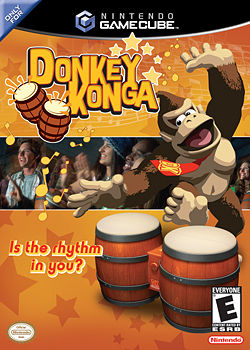 For alternate box art, see the game's gallery. | |||||||||||
| Developer | Namco | ||||||||||
| Publisher | Nintendo | ||||||||||
| Platform(s) | Nintendo GameCube | ||||||||||
| Release date | |||||||||||
| Language(s) | English (United States) French (Canada) Spanish (Latin America) Japanese | ||||||||||
| Genre | Rhythm | ||||||||||
| Rating(s) |
| ||||||||||
| Mode(s) | Single player, multiplayer | ||||||||||
| Format | Nintendo GameCube:
| ||||||||||
| Input | Nintendo GameCube:
| ||||||||||
| Serial code(s) | |||||||||||
Donkey Konga is a Donkey Kong video game for the Nintendo GameCube. It was developed by Namco and published by Nintendo in 2003 in Japan and 2004 overseas. It is the first installment of the Donkey Konga series, and it is notable for being the first game to be compatible with the DK Bongos. A year later, a sequel to the game was released, Donkey Konga 2, followed by Donkey Konga 3 JP, the latter of which never received an international release.
Story[edit]
Donkey Kong and Diddy Kong are strolling across a beach and suddenly find a mysterious pair of barrels. DK attempts to open it but is stopped by Diddy, who believes it is a trap from King K. Rool.
Following Diddy's advice, the duo take the barrels to Cranky Kong. Cranky chuckles and explains that they are bongos. DK decides to call them the "DK Bongos", and he plays on them. Diddy comments that DK is bad at the bongos, and he tries the bongos. DK, in turn, laughs and claims that Diddy plays the bongos poorly. He claps, which cause the bongos to glow. Cranky explains that the instrument glows and makes noises from detecting clapping.
In response, Donkey Kong and Diddy perform and clap with the bongos more. After they make a lot of loud noise, DK becomes discouraged and admits that he and Diddy are not good at playing the bongos. Cranky explains that nobody starts out as a professional, and their performance gradually improves from practicing. DK initially mentions his dislike of practicing, but suddenly realizes that he might achieve fame if he becomes good at the bongos, which Cranky believes to be a possibility. DK and Diddy then daydream about becoming rich and owning lots of bananas, causing Cranky to sigh and remind them to practice; the pair head out to get some training in as the scene ends.
Gameplay[edit]
The main gameplay is largely identical to the Taiko no Tatsujin games, which were also designed by the same developers. The player has the option to utilize the DK Bongos or a standard GameCube controller. During gameplay, the player controls Donkey Kong, whose goal is to hit scrolling notes, known as beats. They must hit it with accurate timing when it moves under a cursor on the far left. There are four types of beats (red, light blue, yellow, and purple), and are each associated with a different button. A word appears on screen for every passing note, and the displayed word is based on the accuracy of the player hitting the beat. A combo is displayed if the player hits two or more consecutive beats, but it vanishes if the player misses a beat.
Modes[edit]
All four gameplay modes (except Challenge) have three levels of difficulty modes, from lowest to highest: Monkey, Chimp, and Gorilla. The second player plays as Diddy Kong in multiplayer modes. Every song has a varying number of beats, which is indicated from the number of barrels next to their titles on the selection menu.
| Image | Name | Description
|
|---|---|---|
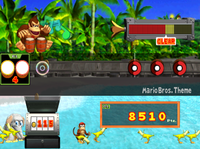 |
Street Performance 1 player |
Based on the concept of street performance, Donkey Kong can perform songs and earn Coins, which he can use to purchase unlockables at DK Town. During gameplay, Donkey Kong earns two coins for every beat that he hits with perfect timing, or one coin for regularly-timed beats. A coin counter appears next to Ellie at the bottom-left with a self-explanatory purpose of keeping count of the number of collected coins. A bar at the top-right corner tracks how many notes the player hit. A "CLEAR" label appears in the center, and it divides the bar into two color-coded segments, red and yellow, which respectively represent poor and good performance. The bar gradually fills up for every note hit by the player, but it contrarily decreases for every missed note. The results are calculated after the song ends; Donkey Kong wins if the bar fills past the Clear label and keeps the Coins that he obtained on the way. If Donkey Kong loses at a challenge, he does not keep the coins. |
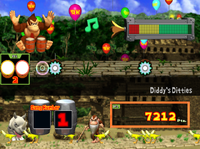 1-2 players |
Challenge | A mode where the player performs an endless number of songs to see how many they can clear. The song number is displayed on a counter in front of two Steel Kegs. |
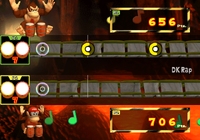 2 players |
Battle | A multiplayer mode where Donkey Kong and Diddy competitively perform a song with a goal for the highest score. |
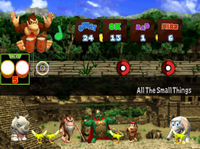 1-4 players |
Jam Session | In this mode, DK and Diddy can practice their performance on songs. A displayed scoreboard counts by accuracy (Great, OK, and Bad) along with the number of missed beats. |
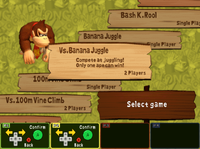 1-2 players |
Ape Arcade | DK and Diddy can play the mini-games here if they purchased them from DK Town. |
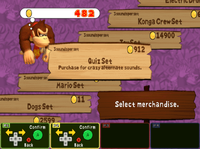 1 player |
DK Town | DK Town is the only mode to solely take place on the main menu. Here, the player has the ability to purchase unlockables, including songs with on Gorilla difficulty level, mini-games, and sound sets. They can also view Street Performance, Challenge, and mini-game high scores in the Hall of Records. The former two options have individual charts per difficulty level. Lastly, the player can access the Electric Hut to change a few settings: Stereo/Mono, Volume Balance, and DK Bongo and Controller. The second option, Default, resets each setting to their default value. |
DK Town unlockables[edit]
Jungle Jams[edit]
The player can purchase individual songs to perform on Gorilla (expert) difficulty.
Bongo Sets[edit]
The player can purchase alternate sounds for the bongos to make during gameplay. They cost the following amount of coins:
- Electric Drum Set: 25,000 coins
- Konga Crew Set: 64 coins
- Toy Set: 14,900 coins
- Quiz Set: 912 coins
- Mario Set: 4,599 coins
- Dogs Set: 11 coins
- Kirby Set: 2,599 coins
- Latin Percussion Set: 1,900 coins
- Zelda Set: 4,599 coins
- Big Band Set: 88 coins
- Laser Space Set: 77 coins
- Car Set: 66 coins
- Country Set: 49 coins
- Barnyard Set: 1,050 coins
- Classical Orchestra Set: 2,220 coins
- Cold Set: 460 coins
- Whip It Set: 707 coins
- Jungle Set: 333 coins
Monkey Shines[edit]
The player can purchase three mini-games to play in the ape arcade, two of which have a 2-player competitive (Vs.) mode.
| Image | Name | Description
|
|---|---|---|
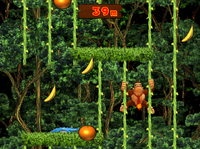 |
100M Vine Climb Cost: 4,800 coins |
Single player: "Climb vines and collect fruit to set records!" Multiplayer (Vs.): "Climb vines and collect fruit to be the king of the Jungle! |
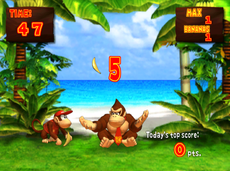 |
Banana Juggle Cost: 5,800 coins |
Single player: "Juggle bananas and set records!" Multiplayer (Vs.): "Compete at juggling! Only one ape can win!" |
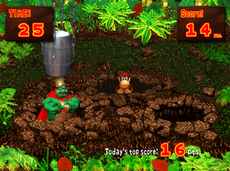 |
Bash K.Rool Cost: 5,800 coins |
"Slam King K.Rool back into the ground. Go for high scores!" |
List of songs[edit]
Donkey Konga features around thirty songs, most of which differ between regional release. Every region has songs that originate from other Nintendo titles along with traditional music, including kids' medleys, pop and classical. Almost every traditional song was made into a shortened cover for the North American release.
| Song | Difficulty | Jungle Jams Cost |
Ordering | |||||
|---|---|---|---|---|---|---|---|---|
| Artist | Song Name | Monkey | Chimp | Gorilla | NA | EU | JP | |
| Diddy's Ditties[note 1] | ★★ | ★★ | ★★★★ | 365 | 1 | |||
| Bingo | ★★★★★ | ★★ | ★★ | 25 | 2 | |||
| Campfire Medley[note 2] | ★ | ★★★ | ★★★ | 580 | 3 | |||
| Pokémon Theme | ★★★ | ★★★★ | ★★★★★ | 250 | 4 | |||
| Kirby: Right Back at Ya! | ★★★ | ★★★★ | ★★★★ | 848 | 5 | |||
| Queen | We Will Rock You | ★ | ★ | ★★★★ | 69 | 6 | ||
| Leslie Carter | Like Wow | ★★★★★ | ★★★★★ | ★★★★★★ | 1898 | 7 | ||
| The Troggs | Wild Thing | ★★ | ★★★ | ★★★★★★ | 580 | 8 | 20 | |
| The Partridge Family | I Think I Love You | ★★★★★★★ | ★★★ | ★★★ | 99 | 9 | ||
| Richard Berry | Louie Louie | ★★ | ★★★★★★ | ★★★★ | 1990 | 10 | 12 | |
| Little Eva | The Loco-Motion | ★★★ | ★★★★★ | ★★★★ | 2060 | 11 | 4 | |
| Earth, Wind, & Fire | Shining Star | ★★ | ★★★ | ★★★★ | 1005 | 12 | ||
| Blink-182 | All the Small Things | ★★★★★ | ★★★★★★ | ★★★ | 1313 | 13 | 10 | |
| Stray Cats | Rock This Town | ★★★★★ | ★★★★★★ | ★★★ | 644 | 14 | ||
| The Supremes | You Can't Hurry Love | ★★★ | ★★★★ | ★★★★ | 3399 | 15 | 9 | |
| Jesus Jones | Right Here, Right Now | ★★★ | ★★★★ | ★★★★ | 1200 | 16 | ||
| Martha and the Vandellas | Dancing in the Street | ★★★★★ | ★★★★★★★ | ★★★★★★★★ | 1745 | 17 | 5 | |
| The B-52's | Rock Lobster | ★ | ★★★★★ | ★★★ | 980 | 18 | ||
| Neil Sedaka | Stupid Cupid | ★★★★★ | ★★★ | ★★ | 1599 | 19 | ||
| The Mighty Mighty Bosstones | The Impression That I Get | ★★★★★★★★ | ★★★★★★ | ★★★ | 1399 | 20 | 14 | |
| The Romantics | What I Like About You | ★★★★★★★★ | ★★★★★★ | ★★★ | 590 | 21 | ||
| Devo | Whip It | ★★★★ | ★★★★★ | ★ | 707 | 22 | ||
| The Crystal Method | Busy Child | ★★★ | ★★★★★★★★ | ★★★★★★★★ | 800 | 23 | 15 | |
| Tito Puente | Para Los Rumberos | ★★★★★★★★ | ★★★★★★★★ | ★★★★★★ | 380 | 24 | 6 | |
| Louis Prima | Sing, Sing, Sing (With a Swing) | ★★★★ | ★★★★★★ | ★★★★★★ | 12 | 25 | 7 | |
| Tito Puente | Oye Cómo Va | ★★★ | ★★★ | ★★★★★★★★ | 2250 | 26 | 11 | |
| Willie Nelson | On the Road Again | ★★ | ★★★★★★★ | ★★★★★★ | 1600 | 27 | ||
| Johannes Brahms | Hungarian Dance No.5 in G Minor | ★★★★ | ★★★★★ | ★★★★ | 1848 | 28 | 23 | 29 |
| Wolfgang Amadeus Mozart | Turkish March | ★★ | ★★★★ | ★★ | 331 | 29 | 24 | 28 |
| DK Rap | ★★★ | ★★ | ★ | 6800 | 30 | 31 | 31 | |
| The Legend of Zelda Theme | ★★★★★★ | ★★★★★ | ★★★★★ | 4900 | 31 | 27 | ||
| Super Mario Bros. Theme | ★★★★ | ★★★★★★★★ | ★★★★★ | 4900 | 32 | 25 | 30 | |
| Donkey Konga Theme | ★★★★ | ★★★★★ | ★★★★★ | 100 | 33 | 30 | 32 | |
| Supergrass | Alright | ★★★★ | ★★★★ | ★★★★★★★ | 250 | 1 | ||
| Jamiroquai | Canned Heat | ★★★★★★ | ★★★★★★ | ★★★★★★★ | 25 | 2 | ||
| Queen | Don't Stop Me Now | ★★★★★★★ | ★★★★★★ | ★★★★★ | 1777 | 3 | ||
| Chumbawumba | Tubthumping | ★ | ★★★ | ★★★★★ | 69 | 8 | ||
| Nena | 99 Red Balloons | ★★★★★★★ | ★★★★★★★ | ★★★ | 99 | 13 | ||
| The Jackson 5 | I Want You Back | ★★★★ | ★★★★★★ | ★★★ | 1898 | 16 | ||
| Jamiroquai | Cosmic Girl | ★★★ | ★★★ | ★★ | 980 | 17 | ||
| Supergrass | Richard III | ★★★★ | ★★★★★ | ★★★★★★★ | 111 | 18 | ||
| Labelle | Lady Marmalade | ★★★★ | ★★★★★ | ★★★★★★★ | 365 | 19 | ||
| Earth, Wind & Fire | September | ★★★★★★★★ | ★★★★★ | ★★★ | 930 | 21 | ||
| Take That | Back for Good | ★★ | ★★★ | ★★ | 707 | 22 | ||
| Donkey Kong Country Theme | ★★★ | ★ | ★★★ | 1600 | 26 | |||
| Rainbow Cruise | ★★★★★ | ★★★★ | ★★★★★★★★ | 1200 | 28 | |||
| Super Smash Bros. Melee Opening | ★★★★★★ | ★★★★★★★ | ★★★★★★★★ | 644 | 29 | |||
| Mori no Kumasan | ★★★★ | ★★★★★★ | ★★★★★★★★ | 903 | 1 | |||
| Clarinet o Kowashichatta | ★★★ | ★★★ | ★★★★ | 1001 | 2 | |||
| Haydn Quartet | Okina Furudokei | ★★★ | ★★★★ | ★★★ | 969 | 3 | ||
| Hyokkori Hyoutanjima[note 3] | ★ | ★ | ★ | 8 | 4 | |||
| Akira Kushida | We are the One (Bokura wa Hitotsu)[note 4] | ★★ | ★★★★★ | ★★★★ | 1200 | 5 | ||
| Hamtaro Tottoko Uta[note 5] | ★★ | ★★★★ | ★★★★★★ | 868 | 6 | |||
| GARDEN | Advance Adventure[note 6] | ★★★★★ | ★★★★★★ | ★★★★ | 1300 | 7 | ||
| Hiroko Asakawa | Kirby![note 7] | ★★ | ★★ | ★★★★ | 1260 | 8 | ||
| Densetsu no Starfy[note 8] | ★★★ | ★★★★★ | ★★★ | 1000 | 9 | |||
| Strawberry Flower | Ai no Uta[note 9] | ★★★★★★ | ★★★★★ | ★★★ | 1000 | 10 | ||
| Yuzu | Mata Aeru Hi Made[note 10] | ★★ | ★★★ | ★★★★ | 1293 | 11 | ||
| Mai Kuraki | Kaze no La La La[note 11] | ★★ | ★★★★ | ★★★★★ | 1000 | 12 | ||
| Aya Matsuura | Momoiro Kataomoi | ★★★★★★★ | ★★★★★★★ | ★★★★★★★ | 1020 | 13 | ||
| Mini-Moni | Mini-Moni Jankenpyon! | ★★★★★★ | ★★★★★★ | ★★★★★★ | 1020 | 14 | ||
| Re:Japan[note 12] | Ashita ga Arusa | ★★ | ★★★★ | ★★★ | 23 | 15 | ||
| Morning Musume | Koi no Dance Site | ★★★★ | ★★★★ | ★★★★★ | 1020 | 16 | ||
| Ayumi Hanasaki | Fly High | ★★★ | ★★★★★★ | ★★★★★★★★ | 1365 | 17 | ||
| SMAP | Shake | ★★ | ★★★★ | ★★★ | 971 | 18 | ||
| Akina Nakamori | Desire (Jōnetsu) | ★★★ | ★★★★★ | ★★★★★★ | 1986 | 19 | ||
| Hikaru Utada | Colors | ★★★ | ★★★ | ★★★★★ | 1100 | 20 | ||
| I Wish | Asu e no Tobira[note 13] | ★★★★ | ★★★★★★ | ★★★★★★★ | 1223 | 21 | ||
| Maxi Priest and Yūji Oda | Love Somebody[note 14] | ★★★★ | ★★★ | ★★ | 110 | 22 | ||
| Godiego | The Galaxy Express 999[note 15] | ★★★★ | ★★★★★ | ★★★★ | 999 | 23 | ||
| Jorge Ben | Mas que Nada | ★★★★★★ | ★★★★★ | ★★★★★★ | 777 | 24 | ||
| Ritchie Valens | La Bamba | ★★★ | ★★★★★★ | ★★★★★★★ | 666 | 25 | ||
| Pérez Prado | Mambo No. 5 | ★★★★★★ | ★★★★★★★★ | ★★★★★★★ | 555 | 26 | ||
| Oklahoma Mixer | ★★ | ★★★ | ★★ | 4900 | 27 | |||
- ^ A medley of Happy Birthday to You; Itsy Bitsy Spider; and Row, Row, Row Your Boat.
- ^ A medley of I've Been Working on the Railroad, She'll Be Coming 'Round the Mountain, Yankee Doodle.
- ^ The theme song for the animated film of the same name.
- ^ The ending theme for Bakuryū Sentai Abaranger.
- ^ The opening theme for Hamtaro.
- ^ The first Japanese opening theme for Pokémon the Series: Ruby and Sapphire.
- ^ The second Japanese opening theme for Kirby: Right Back at Ya!.
- ^ The theme from a Japanese commercial for the game.
- ^ A song created for Japanese commercials for Pikmin.
- ^ The eighth ending theme for the second incarnation of the Doraemon anime.
- ^ The twelfth opening theme for Case Closed, better known as Detective Conan.
- ^ Originally performed by Kyu Sakamoto.
- ^ Opening theme of Ainori.
- ^ Opening theme of Bayside Shakedown.
- ^ Opening theme of the 1979 film adaptation of Galaxy Express 999.
Regional differences[edit]
Aside from a different set of songs, Donkey Konga's North American logo is different from the European and Japanese logo. This change is reflected both in-game and on each region's box cover. The Japanese logo has a subtitle, which western versions do not have.
Every title screen depicts a scene of the beach, but the North American one displays a different scene from the European and Japanese versions. The latter two depict a straight view of the beach, which is partially obscured by the game's logo. The North American title screen shows Donkey Kong and Diddy Kong partying at the shore, complete with a pair of bongos and a boombox in the scene.
The logo on the GameCube menu banner is also different between regions.
There is a start-up warning advising players to be wary of vibrations, the sound, and the time of day they play, though this message does not appear in international releases. A health and safety warning is featured in every regional release of Donkey Konga 2, but this exact warning was also featured in the Japanese version of the sequel.
Reception[edit]
- “As an executive, I hated Donkey Konga[...] The first game actually sold reasonably well, but boy was I not a fan.”
- —Reggie Fils-Aimé
| Reviews | |||
|---|---|---|---|
| Release | Reviewer, Publication | Score | Comment |
| Nintendo GameCube | Tom Bramwell, Eurogamer | 6/10 | In the end, Donkey Konga is just too short-lived, even in multiplayer, to be worth the sort of outlay it represents. Nintendo has been surprisingly generous in its pricing here - most people will sell you the game and a set of bongos for £30 as far as we can see, and extra sets run to just £20 - but with the songs already shortened (and covered by a fairly decent bunch of impersonators, rather than licensed, curiously) Donkey Konga just doesn't have the legs. We appreciate the simplicity of the idea, but in the absence of the hidden depths we normally expect from this sort of game - or the ritual humiliation we now demand - it ultimately wears thin far too quickly. And for that reason we can't see it becoming the eBay legend that Samba was, although we've little doubt that you'll be able to find it on there all too quickly. |
| Nintendo GameCube | Juan Castro, IGN | 8.5/10 | Donkey Konga packs hours of fun. It's a good single-player experience and a great multiplayer one. If you can round up four buddies and four bongo controllers, you're set for the evening. All that's missing in a room with this game (and four bongos) is booze and a bowl of Tostitos. A somewhat limited song selection is the only thing keeping the multiplayer aspect from being the greatest thing EVAR, so to speak. The graphics, while bland and lacking several layers of polish, get the job done without causing too much of an eye-sore. The mini-games offer a little fun, but your best still sits in Kongo's primary game modes. |
| Aggregators | |||
| Compiler | Platform / Score | ||
| Metacritic | 76 | ||
| GameRankings | 77.67% | ||
In a 2022 interview, Nintendo of America executive Reggie Fils-Aimé confessed to hating Donkey Konga, stating he had "pushed back" against the Japanese office regarding the game, finding it unfun to play and that it might hurt the Donkey Kong brand.[2]
Staff[edit]
- Main article: List of Donkey Konga staff
Hiroyuki Onoda was the director of this game and would later reprise his role for its sequels. Koji Kondo and Toru Minegishi are credited as sound support. Along with Masanori Sato, prominent Super Mario franchise illustrator Yoichi Kotabe served as graphic support.
Gallery[edit]
- For this subject's image gallery, see Gallery:Donkey Konga.
Media[edit]
| File info 0:30 |
| File info 0:30 |
| File info 0:30 |
| File info 0:19 |
| File info 0:30 |
References to other media[edit]
- Donkey Kong - When choosing whether to display the screen in 50Hz or 60Hz, Mario (as he appears in Donkey Kong) acts as a cursor, and Donkey Kong (also as he appears in Donkey Kong) stands to the left. The "NES" Bongo Set use sound effects from this game. The left bongo plays Mario's jump sound effect and clapping plays the sound effect of Mario jumping over an obstacle.
- Donkey Kong Jr.: In the "NES" Bongo Set, the right bongo plays the sound effect of Donkey Kong Jr. getting hit by an obstacle.
- The Legend of Zelda series - The Legend of Zelda Theme is featured on the North American, European and Australian versions of the game.
- Donkey Kong Country - The track "Donkey Kong Country Theme" is the Super Smash Bros. Melee arrangement of "DK Island Swing" from this game.
- Pokémon (anime) - The North American release includes the anime's theme song.
- Donkey Kong 64 - Donkey Kong and Diddy Kong's voice clips are recycled from this game during the mini-games. Also, the Super Smash Bros. Melee version of the DK Rap appears in the game.
- Super Smash Bros. Melee - The tracks "Donkey Kong Country Theme", "Rainbow Cruise", "Super Smash Bros. Melee Opening", and "DK Rap" are taken from this game.
- Kirby: Right Back at Ya! - The Japanese and North American releases both include the anime's theme song.
Names in other languages[edit]
| Language | Name | Meaning | Notes |
|---|---|---|---|
| Japanese | ドンキーコンガ[?] Donkī Konga |
Donkey Konga |
References[edit]
- ^ Updated Australian Release List – 24/10/04. PALGN Video Game Feature (Australian English). Archived March 7, 2012, 08:47:11 UTC from the original via Wayback Machine.
- ^ Xplay (May 3, 2022). Reggie Fils-Aimé Interview + Star Wars Games! | Xplay Live (1:07:24). YouTube (English). Retrieved May 3, 2022.
External links[edit]
| Nintendo GameCube games | |
|---|---|
| Super Mario franchise | Luigi's Mansion (2001) • Super Mario Sunshine (2002) • Mario Party 4 (2002) • Mario Golf: Toadstool Tour (2003) • Mario Kart: Double Dash!! (2003) • Mario Party 5 (2003) • Paper Mario: The Thousand-Year Door (2004) • Mario Power Tennis (2004) • Mario Party 6 (2004) • Dance Dance Revolution: Mario Mix (2005) • Mario Superstar Baseball (2005) • Mario Party 7 (2005) • Super Mario Strikers (2005) |
| Donkey Kong franchise | Donkey Konga (2003) • Donkey Konga 2 (2004) • Donkey Kong Jungle Beat (2004) • Donkey Konga 3 JP (2005) |
| Wario franchise | Wario World (2003) • WarioWare, Inc.: Mega Party Game$! (2003) |
| Other | Super Mario 128 (2000, demo) • Super Smash Bros. Melee (2001) • Nintendo Puzzle Collection (2003) • NBA Street V3 (2005) • SSX on Tour (Nintendo Village) (2005) • Donkey Kong Racing (cancelled) • Diddy Kong Racing Adventure (cancelled) |
